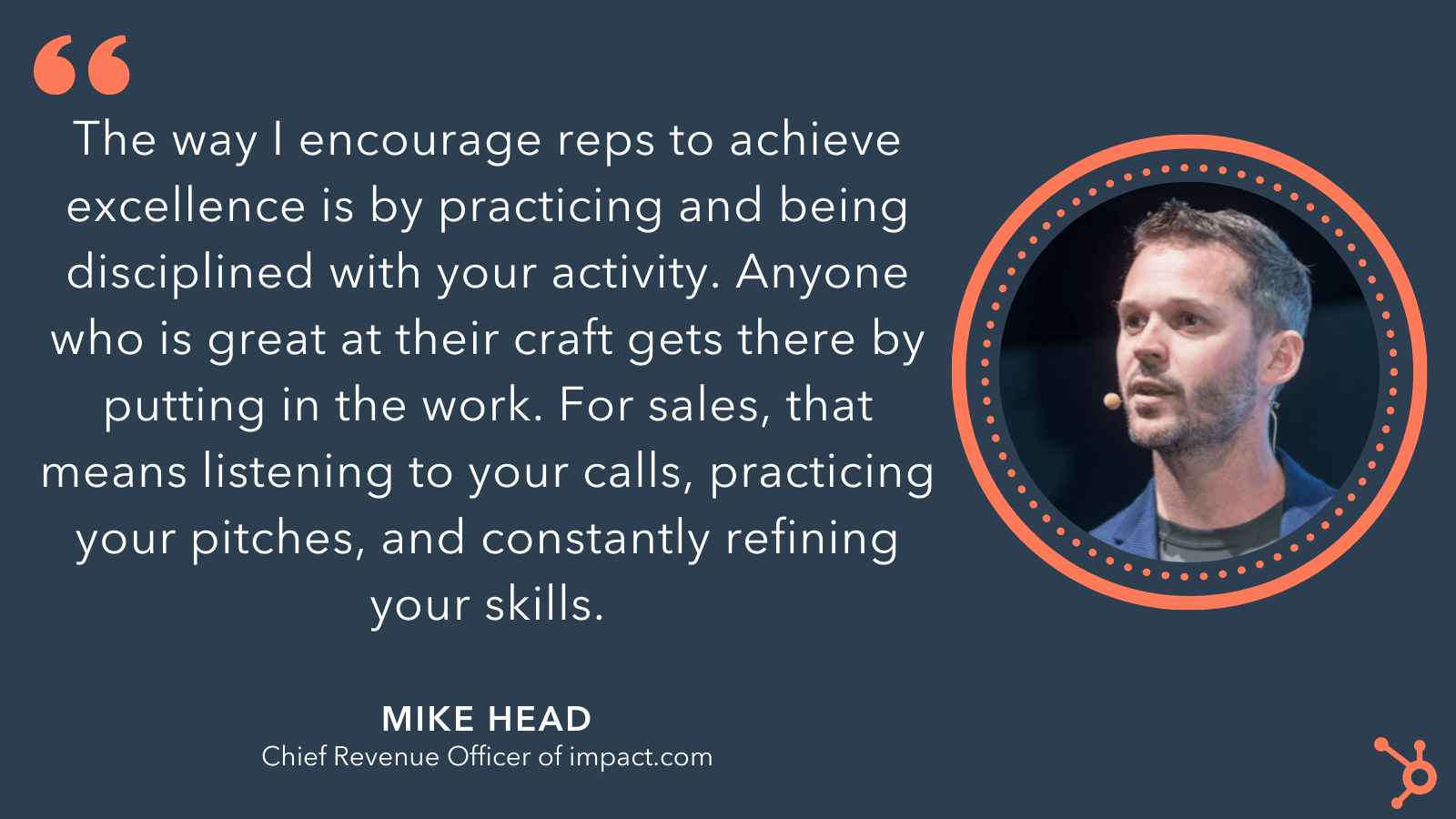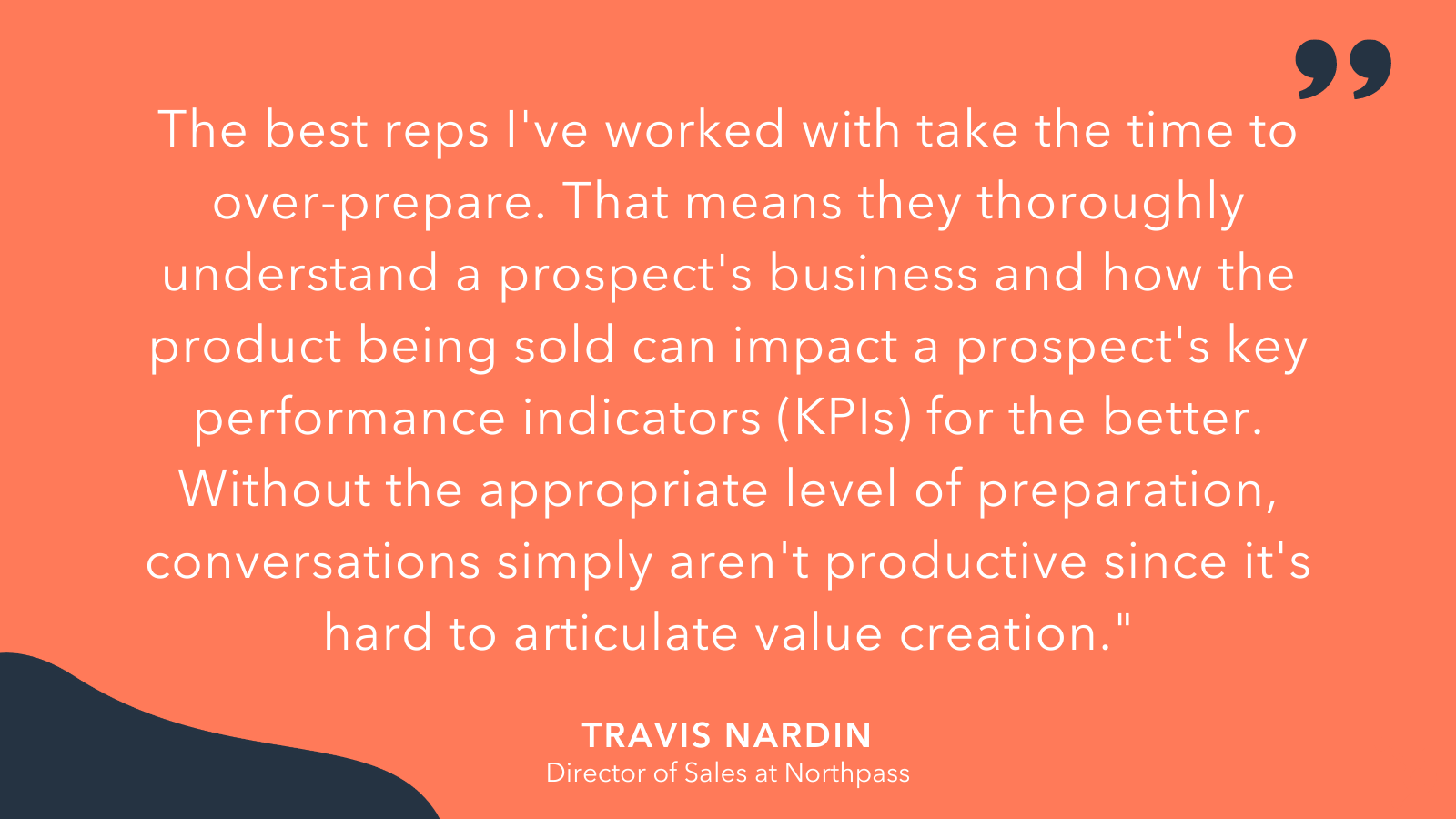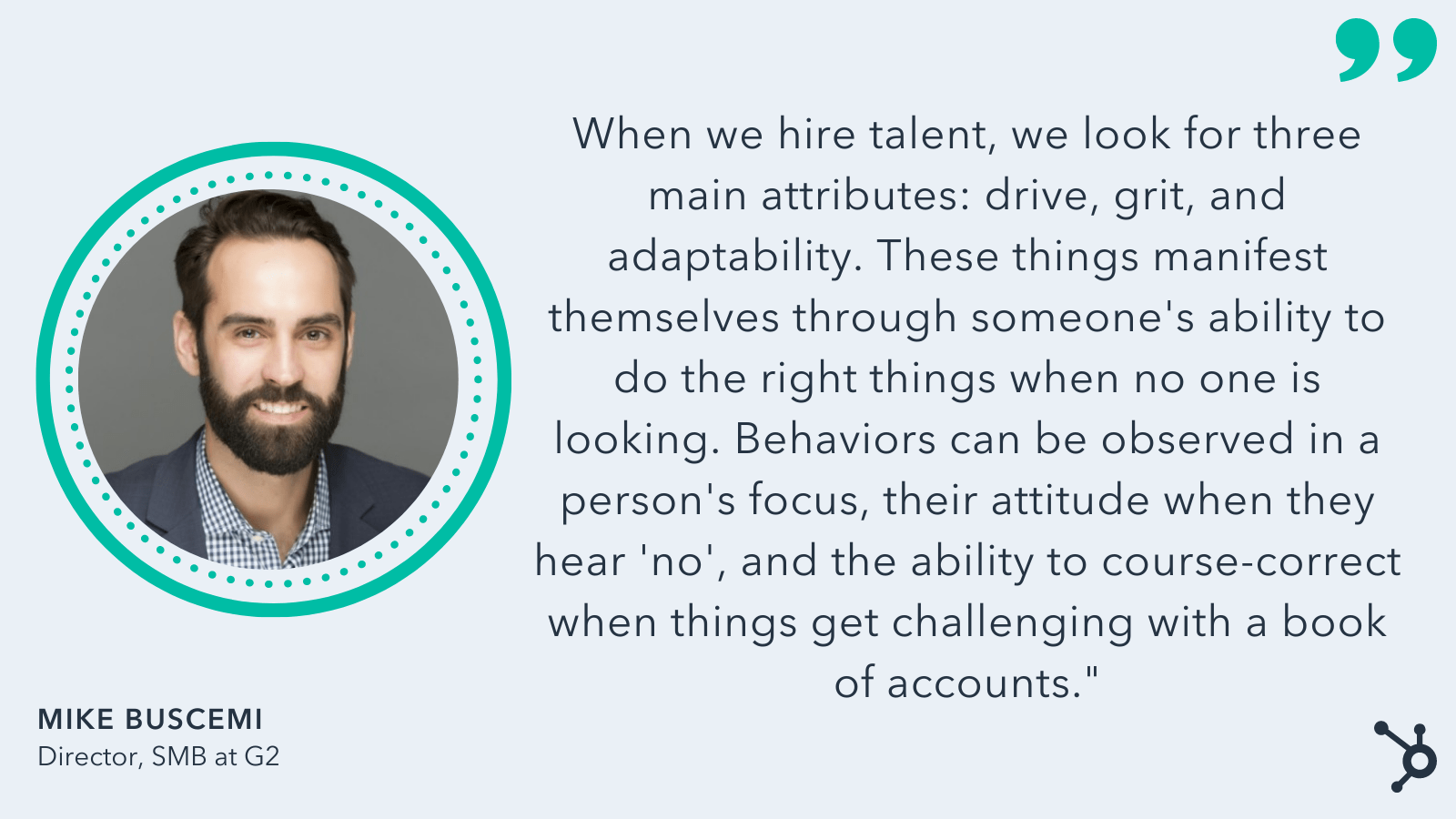Legendary football coach Vince Lombardi was an absolute goldmine for awesome quotes — one of the best ones being, “Perfection is not attainable, but if we chase perfection, we can catch excellence.”
It’s powerful, motivational, and applicable in every field or facet of life, and sales is no exception. As a manager, you’re bound to have reps that go above and beyond — salespeople that take the proper steps to pursue perfection and catch excellence. But what does that look like?
How can you tell if a rep is truly achieving sales excellence? What are the definitive qualities and patterns of behavior that separate excellent reps from the rest of the pack?
Here, let’s explore what sales excellence looks like, how to measure it, and how to achieve it, according to sales managers from G2, Northpass, impact.com, Gong, and Articulate Marketing.
What is sales excellence?

Sales excellence is defined as consistently meeting and exceeding growth targets. It’s a measure of how individual salespeople are performing and how successful an organization is at closing deals.
Sales excellence isn’t just a sign of sales effectiveness, either –– it also highlights your business’ understanding of your target customer. If your business is able to meet and even exceed sales targets, it’s a sign that your customers find your products or services relevant to their needs.
Achieving sales excellence usually requires focusing on developing customer relationships and building trust.
Reps need to know how customers think and behave. They then need to use this knowledge to boost conversions.
To achieve sales excellence, your organization will need an engaged workforce where each rep understands all the necessary systems and processes to meet customer demands and deliver a top-quality experience.
Let’s explore how you should define sales excellence next.
1. Motivation
Achieving sales excellence is, in large part, a matter of putting in more effort than your colleagues. You want your reps to be ambitious and dedicated — willing to do that much more to book an extra meeting or keep a prospect with waning interest in your pipeline.
Truly excellent reps are willing to lock in and take initiative. They excel because they sincerely want to set themselves apart and are willing to prove it. Motivation is the underlying factor that enables every other point on this list. Without it, the other components of sales excellence don’t pan out.
2. Working Smarter
While motivation is central to sales excellence, it doesn’t mean much if it’s applied ineffectively. A rep who haphazardly gives it their all might burn out or see returns that are disproportionately low — relative to the amount of effort they bring to their work.
Excellent reps know how to manage their time and are selective in how they apply their effort. They’re sensible in how they structure their day-to-day. They’re savvy in understanding when a deal isn’t viable enough to warrant an extra push. And they can work tactfully to get the most out of the extra effort they’re willing to put in.
3. Quickly Getting Up to Speed
True sales excellence materializes at every point in a sales rep’s career — no matter how early. One of the marks of a truly excellent sales rep is the speed at which they onboard and ramp to a full workload.
How much did it take for them to learn the ropes? Did they take the initiative to learn the ins and outs of your product or service on their own? Could you be hands-off and still expect them to figure out your sales process?
Sales excellence is often a measure of what a rep can do for your sales org beyond their immediate contributions. By ramping quickly and effectively, an excellent rep spares your company time, effort, energy, and resources.
4. Adaptability
Excellent sales reps resent complacency. They understand that there’s always room for improvement. Falling into inertia is easy in sales. Reps might find a groove or daily rhythm that suits them and avoid embracing different processes, methodologies, or strategies that could improve their efforts.
An excellent rep is willing to keep an open mind. They’re always learning — looking to incorporate any tactics that could help them grow and progress as sales professionals. That could mean something like trying new messaging on sales calls or transitioning to a more customer-centric sales methodology.
Not everything they’ll try will work for them, but excellent sales reps are willing to stay abreast of new strategies that could potentially take them to the next level.
5. An “Onto the Next One” Mentality
Excellent sales reps aren’t afraid to fail. They can take rejection on the chin and keep moving forward — using every hitch and hiccup they run into as a learning experience. If an exceptional rep drops the ball on a deal or botches a call, they don’t sulk or get demoralized.
Instead, they analyze their performance, try to identify where they went wrong, and do everything in their power not to make the same mistake twice. And if they notice they’re running into the same issue consistently, they don’t keep it to themselves. Instead, they seek out some insight that can set them on the right course.
To further understand what sales excellence means, let’s take a look at some examples.
Sales Excellence Examples
Sales excellence can mean meeting or exceeding sales targets, but it’s not just limited to quotas.
Here’s a list of some sales excellence examples to consider while you evaluate your organization:
- An excellent sales rep can meet targets quickly
- An excellent sales rep ramps after a short period of time
- An excellent rep follows up with high-quality leads
- An excellent rep is prepared and diligent when interacting with customers
- An excellent rep is coachable and takes constructive feedback well
- An excellent rep is committed to honing their sales technique and remaining open to change
Other than quantitative metrics, these examples of sales excellence can help you identify what to aim for within your company.
How to Measure Sales Excellence
Accurately measuring sales excellence is vital for understanding how well your reps and overall company are meeting sales targets.
You’ll need to set achievable sales targets and then measure them regularly.
Mike Head, the Chief Revenue Officer of impact.com, told me it’s important to focus on just a few core sales metrics. Reviewing these metrics helps you understand who your best-performing reps are and if your organization as a whole is achieving sales excellence.
As Head puts it, “Talk ratios, question rates, and consistent top of funnel activity levels. If you’re best-in-class on those metrics, you’re always at the top of the leaderboard.”
However, there are some qualities of sales excellence that are less easily measured.
Head says, “The qualities we’re always looking for — but are hard to measure — include curiosity, coach-ability, and discipline.”
He adds, “The way I encourage reps to achieve excellence is by practicing and being disciplined with your activity. Anyone who is great at their craft gets there by putting in the work. For sales, that means listening to your calls, practicing your pitches, and constantly refining your skills.”

To get a full picture of how your sales department is performing, focus on these three groups of metrics:
- Sales performance
- Sales productivity
- Sales proficiency
The exact sales metrics you choose to focus on will depend on your business objectives. Use these metrics as a starting point to guide the ones you decide to focus on.
Sales Performance
Sales performance metrics are probably the first metrics that come to mind when evaluating sales excellence.
Here are the key sales performance metrics to track:
- Total revenue
- Average customer lifetime value (LTV)
- Custom acquisition cost (CAC)
- Year-over-year growth
- Percentage of sales reps attaining 100% quota
These sales performance metrics show you if your reps are achieving sales objectives.
Sales Productivity
According to CSO Insights, just 33% of inside sales rep time is spent actively selling. On top of sales-related tasks, you’ll need to measure how else your team is spending the remaining 77% of their time.
Sales productivity metrics tell you more about how efficiently your sales department is meeting sales targets.
Focus on tracking these sales productivity metrics:
- Percentage of time spent on selling activities
- Number of sales tools used daily
- Percentage of high-quality leads followed up with
- Percentage of time spent on sales tasks
Use these sales productivity metrics to better understand how your sales reps meet, exceed, or miss targets.
Sales Proficiency
Sales proficiency metrics help you understand how skilled your team is in closing deals. These metrics can highlight where team members may need the most help.
These metrics include:
- Time to quota attainment
- Time to first deal
- Time spent in sales onboarding sessions
- Time to ramp
- Time to productivity
It’s worth keeping in mind that only 24.3% of salespeople exceeded their quota in 2021 — which may be because reps aren’t given enough support and training to meet their goals.
Mike Buscemi, Director of SMB at G2, told me his organization invests heavily in their people’s growth.
Buscemi says, “At G2, we discuss career aspirations and drivers on a quarterly basis, so we can help everyone achieve their goals. We try to build real professional and personal relationships with our employees, and managers don’t ask their team members to do something we wouldn’t do ourselves.”
He continues, “We celebrate the small wins such as booking a meeting, helping a teammate on a call, and sharing great messaging or decks. It’s important to celebrate the right behaviors that lead us to our bigger milestones, so we can see what success looks like as individuals and as a collective.”
In addition to quantitative metrics, don’t forget about those qualitative attributes that are important to measure.
As Travis Nardin, the Director of Sales at Northpass told me, it’s not just about meeting number-based goals. There are also attributes that contribute to sales excellence that managers can’t measure with numbers.

Nardin says, “Aside from any sales reps crushing their quotas, I believe that sales excellence can be measured qualitatively through the following: preparation, intellectual curiosity, cross-functional collaboration, and diligence.”
Rewarding those more qualitative skills — such as celebrating how a rep approaches the selling process, or how she built a strong relationship with a prospect — is equally critical for helping your reps aspire to and achieve sales excellence.
Nardin adds, “The best reps I’ve worked with take the time to prepare — and over-prepare, frankly. That means they thoroughly understand a prospect’s business and how the product being sold can impact a prospect’s key performance indicators (KPIs) for the better. Without the appropriate level of preparation, conversations simply aren’t productive since it’s hard to articulate value creation.”
How to Achieve Sales Excellence
Achieving sales excellence doesn’t happen overnight. Instead, it’s an ongoing process.
To achieve sales excellence, you’ll need to work towards building the right combination of processes, people, and programs. Here are a few strategies for helping your team and individual reps achieve sales excellence.
1. Create a strong sales culture.
Creating a supportive and encouraging sales culture is vital for helping sales reps perform at their best.
This starts with defining your company values and mission. Consider how you can shape your sales department to meet these core values.
Most workplace culture is tied to people. So it’s important to hire reps that match your organization’s ethos and values. Think about what qualities and experience your ideal reps would have and how your hiring managers can identify and hire for these attributes.
As Buscemi puts it, “When we hire talent, we look for three main attributes: drive, grit and adaptability. These things manifest themselves through someone’s ability to do the right things when no one is looking. Behaviors can be observed in a person’s focus, their attitude when they hear ‘no’, and the ability to course-correct when things get challenging with a book of accounts.”

He adds, “Drive can easily be measured with accurate sales reporting nowadays. But grit and adaptability are more nuanced and show up in how the salesperson interacts with their teammates, maintains a positive attitude, and perseveres by finding creative ways to change their approach, process, and strategy.”
As an example, Buscemi told me a manager might take note of when an employee keeps their activity high on a Friday afternoon, versus being defeated after a challenging week. Alternatively, he says managers can monitor which of their employees are eager to hear best practices from their peers and are open to implementing change — a key indicator of sales excellence.
Creating a strong sales culture starts with defining your business’s values, knowing what your ideal sales rep looks like, and continuing to inspire your reps once they’re on your team.
2. Focus on actionable sales training and continuously coach reps.
According to Gartner, only 42% of B2B sales reps have managers who are held accountable for providing quality training. But effective coaching from sales managers can unlock an 8% improvement in sales performance.
When you invest in continuous and actionable sales training, you help reps reach their full potential. They’ll know how to respond, act, explain, and sell in different situations.
A few best practices when it comes to sales training includes:
- Schedule regular training updates so your materials remain fresh and up-to-date. Include any product updates, messaging changes, and industry changes in your materials so reps have all the resources they need to succeed in their role.
- Invest in consistent coaching and one-on-one mentorship. Depending on your company this could look like call reviews, role-play scenarios, and peer reviews.
HubSpot Research’s survey of salespeople revealed more than half rely on their peers to get tips for improvement, 44% looked to their manager, 35% to team training resources, and 24% to media. This only highlights the importance of fostering a supportive environment where reps can ask team members for help.
Travis Nardin told me he mentors his company’s sales reps by understanding their own personal goals as well as work needs.
He says, “I first encourage my teammates to identify their personal motivation that drives them to be successful.”
From there, Nardin offers the following tips:
- Treat prospects to coffee to learn more about what makes them tick
- Listen to the recordings of top performers’ calls
- Establish meaningful relationships with key internal stakeholders
- Structure their schedule to allow for periods of diligent, deep work
To unlock reps’ full potential and help them achieve sales excellence, companies need to prioritize training and coaching. This also feeds into building a supportive sales culture where reps are given everything they need to succeed.
3. Choose new sales technology carefully.
One in five sales reps believes they don’t have the right resources to keep their sales processes on track.
But the right sales enablement tools and technology will make your sales reps’ jobs much easier. Choose correctly and the technology will streamline operational processes and increase your business intelligence.
Plus, high-quality sales software gives you access to key analytics, reports, and data that will help inform future sales strategies.
To get started, consider adding these tools to your tech stack:
- Customer relationship management software (CRM)
- Sales enablement software
- Business intelligence software
- Sales engagement software
- Remote tools
Using this software can make your sales operations more efficient and save your reps hours in the workweek.
Whichever tools and software you choose to add to your tech stack, make sure all sales reps know how to use the platforms effectively. Provide onboarding and training sessions so everyone knows how to get the most out of different features. Then, later on, create resources and guides so that reps can easily access help when they need it.
Additionally, ensure your software promotes sales and marketing alignment. Matthew Stibbe, CEO of Articulate Marketing, told me, “‘Two people divided by a common language’. It may be true of Brits and Americans, but it’s also true of sales and marketing. If you can find and define a common vocabulary with definitions for things like MQLs, SQLs, and clear targets and SLAs, you can measure performance more effectively across the whole funnel.”
Rewarding Sales Excellence
Rewarding sales excellence can be tricky. Excellent sales reps are bound to smash any target you give them but might stall if you impose ceilings — meaning capping commission can hold your rainmakers back.
So one of the more straightforward ways to foster sales excellence is to let them earn all the commission they can. Another effective means of enabling sales excellence is allowing for overachievement commission — slightly increased commission on any sales made beyond quota.
That said, your organization might not have the financial flexibility to have a more liberal, generous compensation plan. If your business fits that bill, there are still some sensible courses of action that motivate excellent sales reps without straining your company’s budget.
Prizes can be valuable incentives to motivate your sales rainmakers. Periodically implementing programs like spiffs — short-term, competitive, incentive-based initiatives meant to motivate sales representatives — can keep your excellent reps engaged.
If you offer recognition, a financial incentive, a vacation, or any other sort of reward for achieving a certain level of performance, you can foster sales excellence by actively and demonstratively encouraging it.
Sales excellence isn’t easy to come by. The reps that truly go above and beyond — in their drive, team contribution, and hard results — need to be identified, further challenged, and rewarded for their exceptional performance.
The traits explored in this article are all marks of a truly excellent sales rep, and as a sales manager, you need to do what you can to encourage that kind of behavior.
Try different ways to keep your excellent reps at the top of their game. Sales excellence is a tremendous asset to a sales team, so you have to make a conscious effort to get as much of it out of your reps as possible.

![]()



![Read more about the article Purchase Order: What It Is & How to Create One [Template]](https://www.dimaservices.agency/wp-content/uploads/2021/02/97c0625c-2a39-4fcc-b416-eaf7e1f60e59-300x43.png)